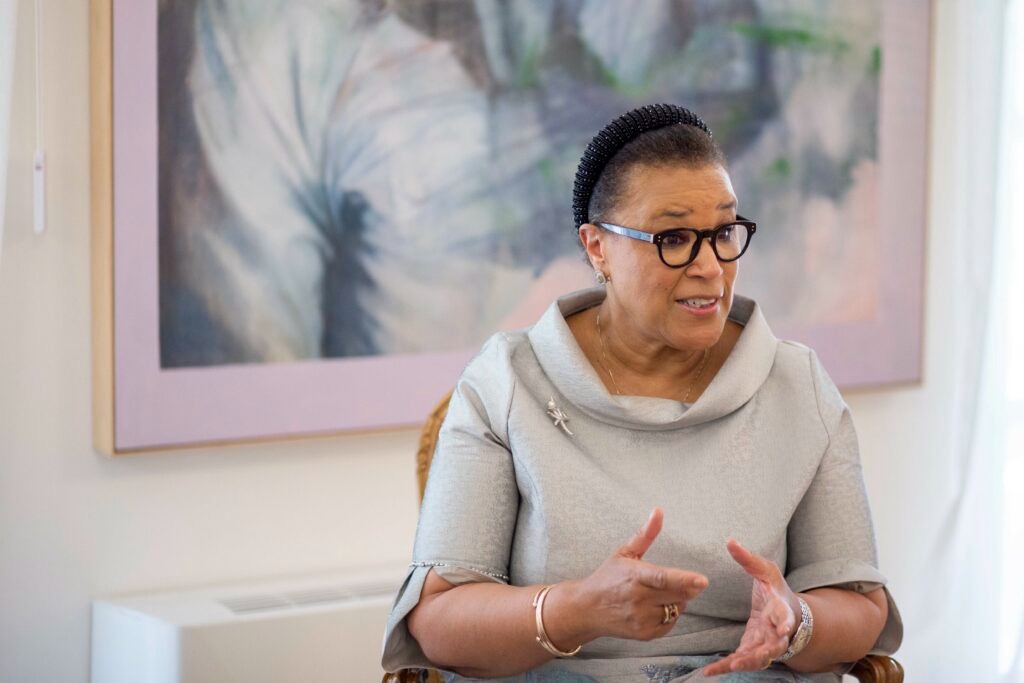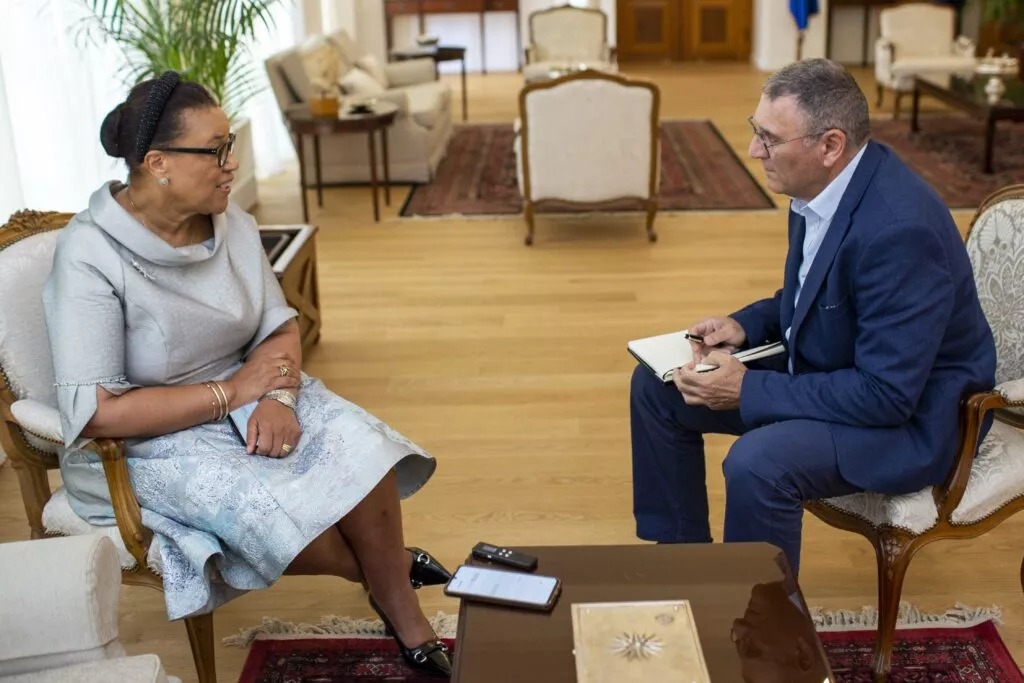The first-ever Commonwealth Ocean Ministers Meeting was held in Cyprus on Friday, April 19. This conference was of particular significance, given that 49 of the 56 Commonwealth members are island states.
Patricia Janet Scotland, Secretary-General of the Commonwealth, was in Cyprus for this historic conference and gave an interview to Phileleftheros on this occasion. She spoke about the role of the Commonwealth in today’s world and the role Cyprus plays in this unique, as she described it, family of nations.
Referring specifically to the conference, Baroness Scotland emphasised that the Commonwealth succeeded in concluding the Blue Charter, something that organisations like the United Nations had not achieved. Baroness Scotland underlined that Cyprus is helping us show the way forward in addressing climate change and protecting the oceans.

What brings you to Cyprus?
Cyprus hosted the first Commonwealth Ocean Ministers Meeting. Cyprus has been at the heart of our ocean efforts for as long as I can remember, but especially since 2016 when I took up the post of Commonwealth Secretary-General. We realised that climate change posed an existential threat to all our members. Of the 56 Commonwealth member states, 49 are ocean states, so it was an extremely important issue for each one of them. In 2016, when I took up my post, we felt we needed to look for a new model to tackle climate change. So, we started a series of sessions involving oceanographers, climatologists, people working on the circular economy, etc. We brought them all together to advise us on the way forward. And Cyprus has always been part of this effort.
By the end of 2016, we realised that as a Commonwealth, we needed to develop a new model to address climate change, to reverse it, not just mitigate or adapt to it. We then turned our attention to the oceans, as no one had focused on this issue before. At one of our meetings, one of the oceanographers told us that it was ‘almost too late’ and that ‘if we don’t do something, it will all be over’. Our members themselves said it wasn’t too late and worked passionately to organise the first ocean conference at the United Nations.
This effort was led by Fiji, one of our Commonwealth members. This prompted us to create a Blue Charter, which would not just be a slogan or emblem but a real action plan that would unite our countries through the creation of action groups. Cyprus represented Europe, Seychelles represented Africa, Fiji represented the Pacific, Barbados and Grenada represented the Caribbean, so we had representation across all continents, and that is how the Blue Charter was ‘born’, which was then adopted at the 2018 CHOGM summit. We continue to work on this, with Cyprus always at the heart of these efforts. When we decided to hold the first Ocean Ministers Meeting, Cyprus was the first to raise its hand to host it, and they are helping us to show the way.
Is this the role of the Commonwealth today?
We are now 75 years old, and what I think many people don’t understand is that the modern Commonwealth is completely different from the old idea of empire. I think the Queen herself said back in 1953 that it was a completely new idea, not based on the old notion of empire. It is based on independent and sovereign countries that choose to come together to offer something for the common good. And it started – if I remember correctly – with eight countries, including India, Bangladesh, Pakistan and Sri Lanka. These were countries that had fought for their independence from the empire but still wanted to be part of this family. Today we have countries like Rwanda, Namibia, Cameroon, Togo and Gabon, which had no connection to the Commonwealth but have become members of this family.
What unites us is not a treaty but a set of principles. The majority have common laws, parliamentary systems and institutions, which makes communication between us easier and more effective. Our trade with each other stands at $700 billion and is growing, and we aim to reach $1 trillion by 2026 and $2 trillion by 2030. Geographically, we cover the entire world, and our decisions can influence all continents. Through our meetings, we can understand what is happening in the world around us.
That was my next question: what are the relationships like among the Commonwealth member states themselves?
This is something that the member states have been doing for 75 years, speaking as a family within the Commonwealth. If you observe us, you will see that we behave like a family. And like any family, there are times when we disagree and times when we don’t get along, but at the end of the day, we are a family, and we reach a consensus.
We have many examples where agreements were not reached at international conferences, but then the Commonwealth came together and agreed. Take the Blue Charter, for instance. The G20 couldn’t agree, nor could the UN, but then we came together at the Commonwealth Heads of Government Meeting and agreed on everything. The beauty of the Commonwealth is that each country has one vote, whether it is Nauru with 11,000 people or India with 1.3 billion. It doesn’t matter how rich or powerful a country is, everyone around the Commonwealth table is equal. And this helps with dialogue and finding solutions.
Will we have a Commonwealth Heads of Government Meeting in Cyprus soon?
That is something you should ask your President. Each summit is held in a different geographical region. We’ve had Africa, now we have the Pacific, and in 2018, the UK took Vanuatu’s place, so Europe’s turn hasn’t come around yet.
I know that a few years ago, there was a proposal for Cyprus to host a summit. And if Samoa can host such a summit, why not Cyprus, which has done so in the past?
The CHOGM summit is important because it brings together leaders from all these countries in one place to discuss, not just officially but often freely, many issues.
And now, at the Ocean Ministers Meeting, you will see that regardless of where they come from, they are all fighting for the same cause. Sea-level rise, plastic pollution and many other issues are at the heart of their discussions.
They can share not just common problems but also solutions. Each country can share its own experiences and expertise with others to help them tackle their own seemingly unique but ultimately shared problems.
For example, Cyprus did something amazing in tackling thalassemia (Mediterranean anaemia). In contrast, the Maldives had a terrible problem; they had spent millions but continued to see children and families dying without being able to tackle it.
At one of the Health Ministers Meetings, Cyprus shared how it had successfully tackled thalassemia for the past 50 years. Cyprus then took on the task of helping the Maldives tackle a problem, a nightmare that was considered insurmountable and for which they were spending a fortune. So, the solution to the problem faced by the Maldives lay in the experience of Cyprus.
What we are saying today is that if one of us spends a dime, a pound or a dollar, there is no need for another to spend the same amount. We can pool our knowledge, experiences and expertise to find solutions.






